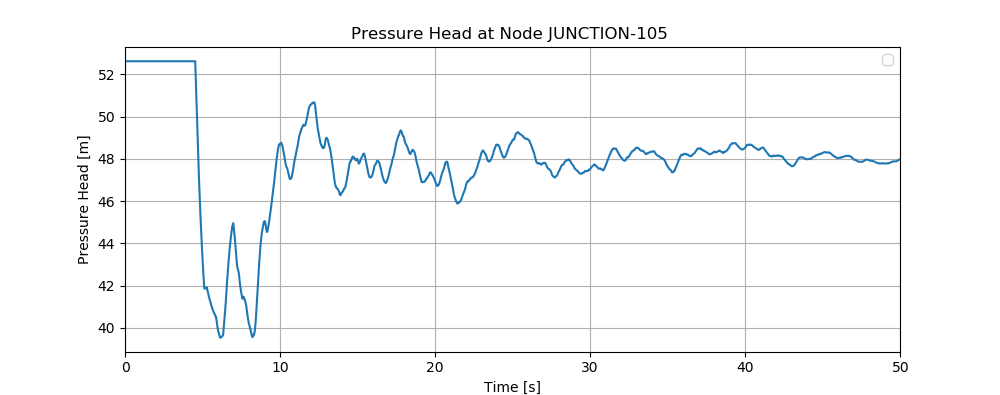Simulation Results¶
Results Structure¶
Simulation results are returned and saved in the
tsnet.network.model.TransientModel object
for each node and link in the networks.
Node results include the following attributes:
- Head [m]
- Emitter discharge (including leaks and bursts) [\(m^3/s\)]
- Actual demand discharge [\(m^3/s\)]
Link results include the following attributes:
- Head at start node [m]
- Flow velocity at start node [\(m^3/s\)]
- Flow rate at start node [\(m^3/s\)]
- Head at end node [m]
- Flow velocity at end node [\(m^3/s\)]
- Flow rate at end node [\(m^3/s\)]
The result for each attribute is a Numpy array, representing the time history of the simulation results, the length of which equals the total number of simulation time steps (\(tn\)).
For example, the results of head, emitter discharge and demand discharge at node ‘JUNCTION-105’ can be accessed by:
node = tm.get_node['JUNCTION-105']
head = node.head
emitter_discharge = node.emitter_discharge
demand_discharge = node.demand_discharge
To obtain the results on pipe ‘LINK-40’:
pipe = tm.get_link('LINK-40')
start_head = pipe.start_node_head
end_head = pipe.end_node_head
start_velocity = pipe.start_node_velocity
end_velocity = pipe.end_node_velocity
start_flowrate = pipe.start_node_flowrate
end_flowrate = pipe.end_node_flowrate
Time Step and Time Stamps¶
Additionally, the time step (in seconds) and the time stamps (in seconds
from the start of the simulation) are also stored in the
tsnet.network.model.TransientModel object. They can be retrieved
by:
dt = tm.time_step
tt = tm.simulation_timestamps
The results can then be plotted with respect to the time stamps using matplotlib or any other preferred package, as shown in Figure 10:
import matplotlib.pyplot as plt
plt.plot(tt ,head)
Results Retrieval¶
The tsnet.network.model.TransientModel object, including
the information of the network, operation rules, and the simulated results,
is saved in the file results_obj.obj, located in the current folder.
The name of the results file is defined by the input parameter result_obj.
If result_obj is not given, the default results file is results.obj.
To retrieve the results from a previously completed simulation,
one can read the tsnet.network.model.TransientModel object
from the results_obj.obj file and access results from the objet by:
import pickle
file = open('results.obj', 'rb')
tm = pickle.load(file)
Runtime and Progress¶
At the beginning of transient simulation, TSNet will report the approximation simulation time based on the calculation time of first few time steps and the total number of time steps. Additionally, the computation progress will also printed on the screen as the simulation proceeds, as shown in Figure 11.
